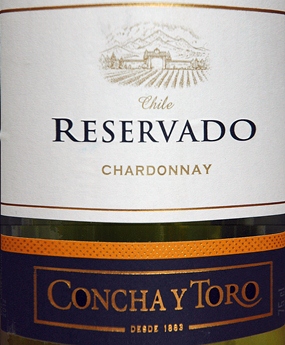The bustling city of Santiago stands against the theatrical backdrop of the Andes Mountains. It is Chile’s capital, located in the Valle Central at an altitude of nearly two thousand feet above sea level. With dozens of shopping centers, impressive high-rise architecture and a toll-based ring road and inner-city highway system, it’s Latin America’s most modern metropolitan area. Santiago is also the financial, cultural and political centre of Chile. It’s also the headquarters of the wine company Concha y Toro, the largest wine producer in Latin America.
The Concha y Toro vineyard was founded by the splendidly-named Don Melchor de Santiago Concha y Toro in 1883. He was a local business man and politician, and he started his vineyards using grapes brought from Bordeaux. The company began exporting wine in 1933 and over the years acquired more and more vineyards. Today, the company employs nearly three thousand people and owns thousands of acres of vineyards in Chile’s wine-growing areas.

As you might have guessed, or knew already, Concha y Toro literally translated means “shell and bull”. The company makes some superb top-of-the-range award-winning wines but for sheer quality and bargain prices these two are hard to beat. And wine doesn’t come very much cheaper than this. At least, not here in the Land of Smiles.
Concha y Toro Chardonnay Reservado (white) Chile, 2012 (Bt. 309 @ Friendship)
This pale yellow wine has a lovely sweet aroma of fresh apples and pineapples but there are other more distant aromas in there too. Possibly honey and melon, but I wouldn’t lay much money on the melon. The wine turns out to be very slightly sweet and not totally dry, as I was expecting. Of course, if I had read the back label it would not have come as a surprise, but I usually try to avoid reading the back label before tasting the wine. If you think of sweetness on a scale from one to ten, with “one” being dry as a bone and “ten” being syrupy sweet, I’d put this wine in at about number two. Or possibly three. It has a pleasantly soft and refreshing mouth-feel with quite a bit of fresh fruit and a decently long fruity finish. If you prefer your whites soft and round, with none of the tart dryness that you find (for example) in a Sauvignon Blanc, you’ll probably enjoy this attractive easy-drinker. It would make a good partner for fish or shellfish. I’m not sure whether it would work too well with chicken. I know these things are terribly subjective, but I think I’d prefer something drier with chicken and with a dash more acidity. As for cheese, it would go well with nutty cow’s milk cheeses. Cheeses with a nutty flavour I mean, like Swiss Emmenthal or Gruyère, not cheeses from nutty cows.
Concha y Toro Cabernet Sauvignon Reservado (red) Chile, 2012 (Bt. 309 @ Friendship)
Now then, here’s a terrific red. It has an aroma of black fruit, hints of leather and tobacco with dried herbs in the background. This is a delightfully complex aroma that certainly deserves spending time over. And don’t let me catch you having a furtive swig before you’ve really given this wine a good nosing, otherwise you’ll receive an unwelcome prod in the behind with a pointed stick.
On the palate, plums and black fruit are out in force and stand out against the dark tannic background. It’s a rich wine, medium-bodied and at this price, an amazing bargain. It’s well balanced with soft tannins and fruit forward too, but I must add here, not the “in yer face” style of some New World wines. There’s also a very pleasant dry and fruity finish. In some wines, the fruit flavours tend to fade away from the palate after a short time, leaving you with a rather empty dry finish and only the tannin left. But not this baby. No siree! You’ll get fruit all the way through from the first taste to the end.
I’d be perfectly happy to enjoy this smooth and charming wine all evening on its own, because there’s so much interest in every mouthful. The bottle’s back label describes the finish as being “nice”. But I think they are being far too modest. Perhaps it’s a Chilean custom.




